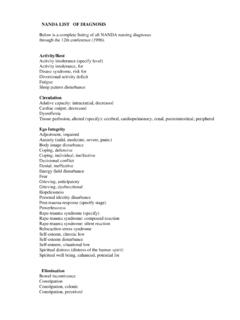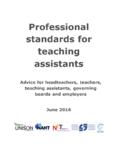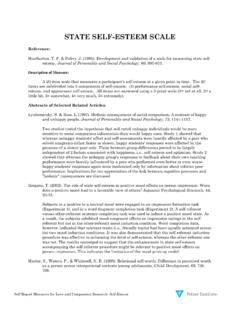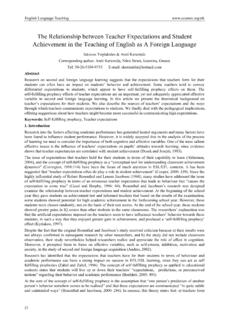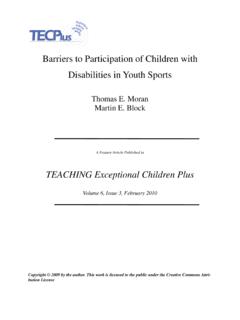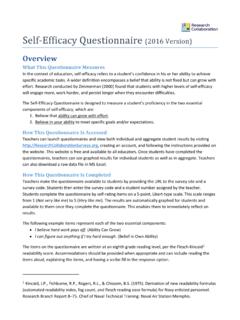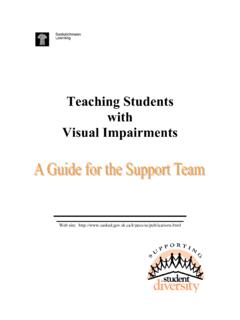Transcription of PROGRAMME OF STUDY FOR PSHE EDUCATION
1 PROGRAMME OF STUDY FOR PSHE EDUCATIONKEY STAGES 1-5 The national body for Personal, Social, Health and Economic (PSHE) educationThe PSHE Association is the national body for personal, social, health and economic (PSHE) EDUCATION the school curriculum subject that supports pupils to be healthy, safe and prepared for modern life. PSHE EDUCATION incorporates health EDUCATION , relationships EDUCATION /RSE and economic wellbeing and careers. A charity and membership organisation, the Association works to improve PSHE EDUCATION standards by supporting a national community of teachers and schools with resources, training and advice. Find out more and become a member at PSHE Association 2020| the statutory content.
2 Using the PROGRAMME of note about the learning Association PROGRAMME STAGE Theme 1: Health and Theme 2: Theme 3: Living in the Wider World ..KEY STAGE Theme 1: Health and Theme 2: Theme 3: Living in the Wider World ..KEY STAGE Theme 1: Health and Theme 2: Theme 3: Living in the Wider TO STATUTORY stage stage PSHE Association 2020| 4 INTRODUCTIONP ersonal, Social, Health and Economic (PSHE) EDUCATION is a school subject through which pupils develop the knowledge, skills and attributes they need to manage their lives, now and in the future. It helps children and young people to stay healthy and safe, while preparing them to make the most of life and work.
3 When taught well, PSHE EDUCATION also helps pupils to achieve their academic potential. Most of PSHE EDUCATION becomes statutory for all schools from September 2020 under the Children and Social Work Act 2017. This includes Relationships EDUCATION at key stages 1 and 2, Relationships and Sex EDUCATION (RSE) at key stages 3 and 4, and Health EDUCATION in both primary and secondary phases. The Department for EDUCATION published Statutory Guidance for Relationships EDUCATION , Relationships and Sex EDUCATION (RSE) and Health EDUCATION in June 2019. This sets out what schools must cover from September 2020 (though not all they should cover as part of broader PSHE EDUCATION ).
4 This updated edition of the PSHE Association PROGRAMME of STUDY for PSHE EDUCATION will support schools to provide a comprehensive PROGRAMME that integrates, but is not limited to, this statutory content. A broader PSHE PROGRAMME should also cover economic wellbeing, careers and enterprise EDUCATION , as well as EDUCATION for personal safety, including assessing and managing risk. This PROGRAMME of STUDY sets out learning opportunities for key stage 1 to 5, based on three core themes: CORE THEME 1: HEALTH AND WELLBEINGCORE THEME 2: RELATIONSHIPSCORE THEME 3: LIVING IN THE WIDER WORLD PSHE Association 2020| 5 COVERING THE STATUTORY CONTENTThe statutory guidance is comprehensively covered by learning opportunities across all three core themes.
5 Even though much of Living in the wider world is not included in statutory requirements, the theme as a whole remains vitally important for pupils personal development and economic wellbeing, as well as in supporting schools to meet the Gatsby Benchmarks for careers EDUCATION as part of the DfE Careers final section of the PROGRAMME of STUDY sets out the content grids from the Statutory Guidance for Relationships EDUCATION , RSE and Health EDUCATION , mapped to the PROGRAMME of STUDY , clearly identifying the PROGRAMME of STUDY learning opportunities that address each bullet point from the statutory are committed to raising the standard of PSHE EDUCATION nationally, so this PROGRAMME of STUDY is freely available to all.
6 In order to access our new PROGRAMME Builders, which break down learning by year group into half-term blocks, and a wide range of additional support and professional development opportunities, we encourage all schools to become members of the PSHE THE PROGRAMME OF STUDYThe PROGRAMME of STUDY sets out learning opportunities for each key stage, in each core theme, organised under subheadings. These learning opportunities should be used flexibly to plan your PROGRAMME according to pupils development, readiness and needs, and taking into account prior learning, experience and understanding. Learning from one area may be related and relevant to others. Whilst this framework distinguishes three separate core themes, there will be extensive overlap, so when planning schemes of work, schools may draw from more than one theme.
7 For example, Relationships and Sex EDUCATION (RSE) falls within both Health and Wellbeing and Relationships , as sexual health should always be considered as an element of health EDUCATION but also taught within the context of healthy relationships. Similarly, whilst they are specifically addressed where appropriate, assessing and managing risk and managing life online are integrated throughout all three core themes. PSHE EDUCATION addresses both pupils current experiences and preparation for their future. The PROGRAMME of STUDY therefore provides a spiral curriculum to develop knowledge, skills and attributes, where prior learning is revisited, reinforced and extended year on year.
8 This is grounded in the established evidence base for effective practice in PSHE EDUCATION . More on this and other relevant research can be found in the evidence and research section of the PSHE Association PROGRAMME of STUDY identifies a broad range of important issues, but it is essential to prioritise quality over quantity (so that PSHE lessons are not simply a series of one-off, disconnected sessions) whilst ensuring that your PROGRAMME reflects the universal needs of all children and young people, as PSHE Association 2020| 6well as the specific needs of the pupils in your school or community. When planning and ordering topic areas for your pupils, it is therefore important to start with identifying their needs.
9 Examples of useful data sources include Public Health England Child and Maternal Health (CHIMAT) data sets, your local authority s joint strategic needs assessment (JSNA) and your own knowledge of your pupils needs. It is important that pupils recognise their PSHE EDUCATION as relevant and applicable across many important areas of their lives. Unlike many other subjects, much of the specific knowledge taught in PSHE EDUCATION changes regularly, for example as a result of legal changes, medical or technological advances. It is therefore important to ensure that all information used to develop pupils knowledge on any aspect of PSHE EDUCATION is up to date, accurate, unbiased and balanced.
10 A NOTE ABOUT THE LEARNING OPPORTUNITIESMany of the learning opportunities, particularly in key stages 3 and 4, refer to managing or responding to challenging situations. By these terms we mean a variety of strategies which, depending on the context, might include: being able to identify risks or warning signs; resisting internal or external pressures; making informed decisions; exit strategies for unsafe situations; and knowing whom, how and when to ask for help, including reporting concerns. The terms managing and responding to in learning opportunities, should not be interpreted as suggesting that children and young people are responsible for the risks they encounter.

